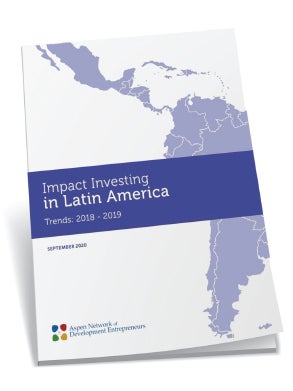 Today, impact investing is a key part of the investment industry. Impact investors look for financial returns—but in a way that contributes to the good of society. They use private-sector strategies to fund innovations that attempt to solve some of the planet’s toughest social and environmental challenges. In September, the Institute’s Aspen Network of Development Entrepreneurs released the latest edition of its biennial report, Impact Investing in Latin America. Using data from investors active in Latin America, the report offers a snapshot of capital allocation in the region. Roughly half of the investors targeted market-rate returns, meaning incorporating social impact into investment decisions is financially viable. Also, the number of local investors is increasing: more than half of those headquartered in the region began impact investing in the past five years. Finally, many investors featured in the study actually measure their outcomes against the UN’s Sustainable Development Goals, a kind of sustainability roadmap. Yet challenges remain. Recipients tend to be established agricultural firms, rather than early-stage enterprises in other vital areas, like biodiversity, health care, and energy. Plus, the vast majority of investments use traditional financing structures (debt or equity), despite the global industry’s increased focus on alternative instruments (such as quasiequity). Currently, investors are concerned about the macroeconomic and political implications of Covid-19—and hopeful that impact investments will become a potent solution for recovery.
Today, impact investing is a key part of the investment industry. Impact investors look for financial returns—but in a way that contributes to the good of society. They use private-sector strategies to fund innovations that attempt to solve some of the planet’s toughest social and environmental challenges. In September, the Institute’s Aspen Network of Development Entrepreneurs released the latest edition of its biennial report, Impact Investing in Latin America. Using data from investors active in Latin America, the report offers a snapshot of capital allocation in the region. Roughly half of the investors targeted market-rate returns, meaning incorporating social impact into investment decisions is financially viable. Also, the number of local investors is increasing: more than half of those headquartered in the region began impact investing in the past five years. Finally, many investors featured in the study actually measure their outcomes against the UN’s Sustainable Development Goals, a kind of sustainability roadmap. Yet challenges remain. Recipients tend to be established agricultural firms, rather than early-stage enterprises in other vital areas, like biodiversity, health care, and energy. Plus, the vast majority of investments use traditional financing structures (debt or equity), despite the global industry’s increased focus on alternative instruments (such as quasiequity). Currently, investors are concerned about the macroeconomic and political implications of Covid-19—and hopeful that impact investments will become a potent solution for recovery.